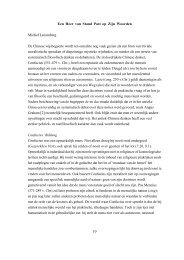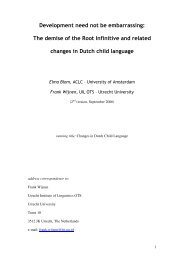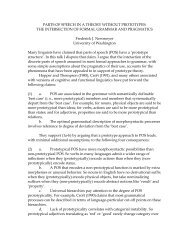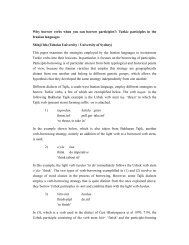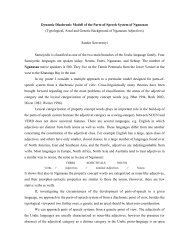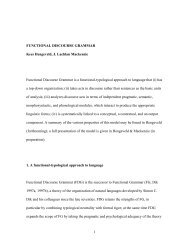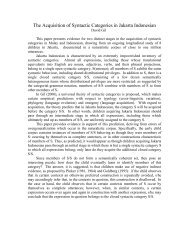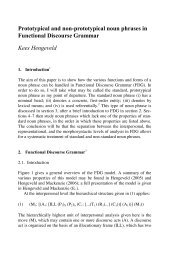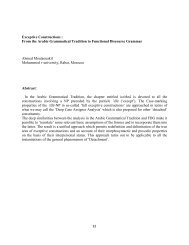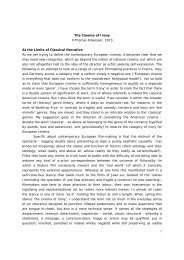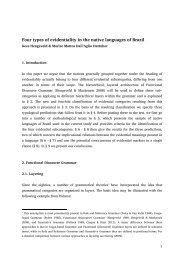The argument structure of deverbal nouns in Brazilian Portuguese
The argument structure of deverbal nouns in Brazilian Portuguese
The argument structure of deverbal nouns in Brazilian Portuguese
Create successful ePaper yourself
Turn your PDF publications into a flip-book with our unique Google optimized e-Paper software.
o-s cort-e-s que eles d-ão n-a-s<br />
the.M-PL cut-NMLZ-PL that they make-IND.PRS.3PL <strong>in</strong>-the.F-PL<br />
cena-s (DID-DP-234)<br />
scene-PL<br />
‘it is <strong>in</strong>credible what happens there the cuts they make <strong>in</strong> the scenes’<br />
b.* é <strong>in</strong>CRÍvel o que aparece lá os cortes das cenas que eles dão nas cenas é::<br />
‘it is <strong>in</strong>credible what happens there the cut <strong>of</strong> the scenes that they make <strong>in</strong> the scenes’<br />
In (27a) reference to the <strong>argument</strong>s <strong>of</strong> cortes ‘cuts’ is made <strong>in</strong>side the relative<br />
clause that follows. <strong>The</strong> <strong>in</strong>appropriateness <strong>of</strong> an overt <strong>argument</strong> has much to do<br />
Economy Pr<strong>in</strong>ciple by Haiman (1983). S<strong>in</strong>ce this type <strong>of</strong> non-overt expression<br />
depends on semantic shar<strong>in</strong>g <strong>of</strong> participants, FDG can house it very appropriately at<br />
the Representational Level.<br />
<strong>The</strong> <strong>argument</strong>s <strong>of</strong> criação ‘creation’ <strong>in</strong> (26a), which are given zero anaphora<br />
expression <strong>in</strong> the nom<strong>in</strong>alized term, are easily recoverable from the preced<strong>in</strong>g text.<br />
<strong>The</strong> potential subject is ele ‘he’, that is, o homem pré-histórico ‘the prehistorical<br />
man’, and the potential object is imagem ‘image’; unlike the <strong>argument</strong>s <strong>in</strong> (25) and<br />
(26), they could be expressed with<strong>in</strong> the term, but the application <strong>of</strong> the Economy<br />
Pr<strong>in</strong>ciple leads to non-overt <strong>argument</strong>s <strong>in</strong> the term headed by the <strong>deverbal</strong> noun<br />
criação ‘creation’.<br />
Observe now (28a):<br />
(28)a na medida... em que acab-ava a caça d-o lugar<br />
as the same time that be over-IND.IPFV.3SG the.F hunted <strong>of</strong>-the.M place<br />
OU (que) em virtude d-a época d-o ano<br />
OR (that) by virtue <strong>of</strong>-the.F season <strong>of</strong>-the.M year<br />
n-o <strong>in</strong>verno por exemplo... imigr-avam para lugar-es<br />
<strong>in</strong>-the.M w<strong>in</strong>ter for example migrate-IND.IPFV.3PL to place-PL<br />
mais quente-s eles também precis-avam<br />
more warm-PL they also need-IND. IPFV.3PL<br />
acompanh-ar... a migr-ação d-a caça (EF-SP-405:49)<br />
follow-INF the.F migrate-NMLZ <strong>of</strong>-the.F hunted<br />
‘as the time that the hunted <strong>of</strong> the place was over OR (that) by virtue <strong>of</strong> the season <strong>in</strong> the w<strong>in</strong>ter<br />
for <strong>in</strong>stance… they used to migrate to warmer places, they also needed to follow the…<br />
migration <strong>of</strong> the hunted’<br />
<strong>The</strong> first <strong>argument</strong> <strong>of</strong> the <strong>deverbal</strong> noun migração ‘migration’ - caça, (literally<br />
‘hunted’, mean<strong>in</strong>g ‘animals to be hunted’) - does not represent secondary or<br />
backgrounded <strong>in</strong>formation; rather, by display<strong>in</strong>g a contrast with the parallel<br />
expressions given <strong>in</strong> (28b-c), the presence <strong>of</strong> the repeated PP da caça ‘<strong>of</strong> the hunted’<br />
becomes absolutely necessary for the thematic cont<strong>in</strong>uity.<br />
(28)b migr-ação d-o homem<br />
migrate-NMLZ <strong>of</strong>-the.M man<br />
‘man’s migration’<br />
16




